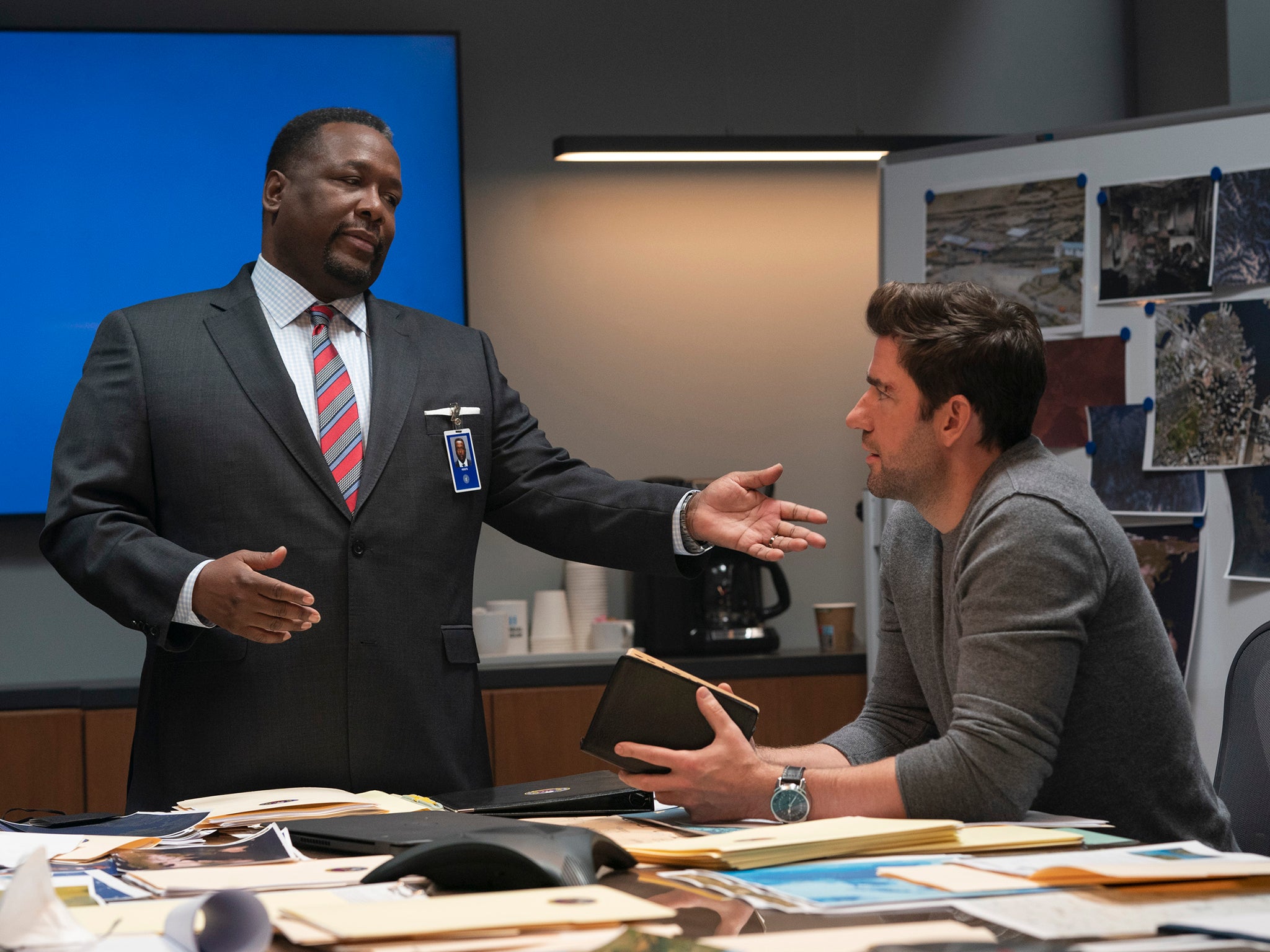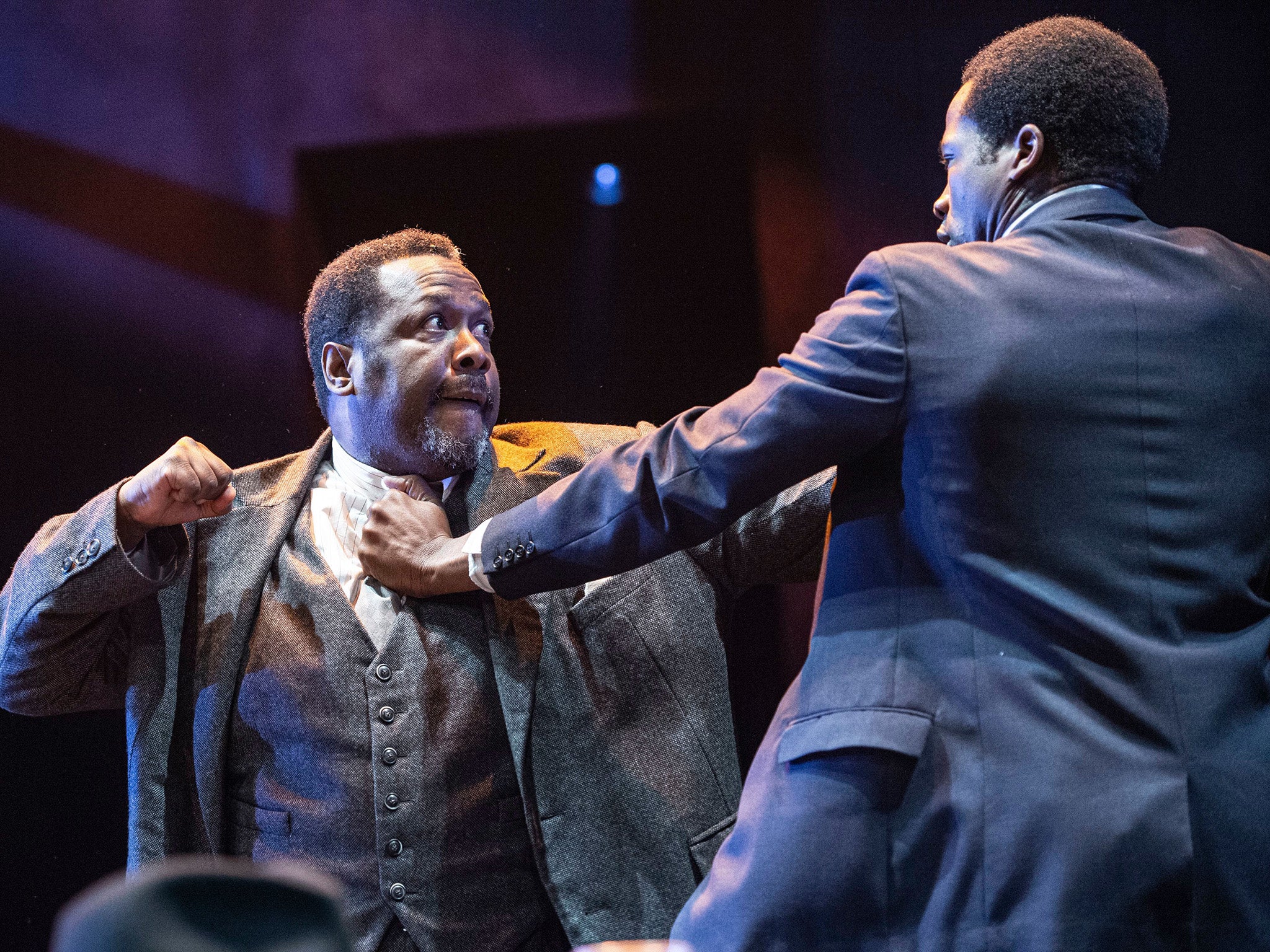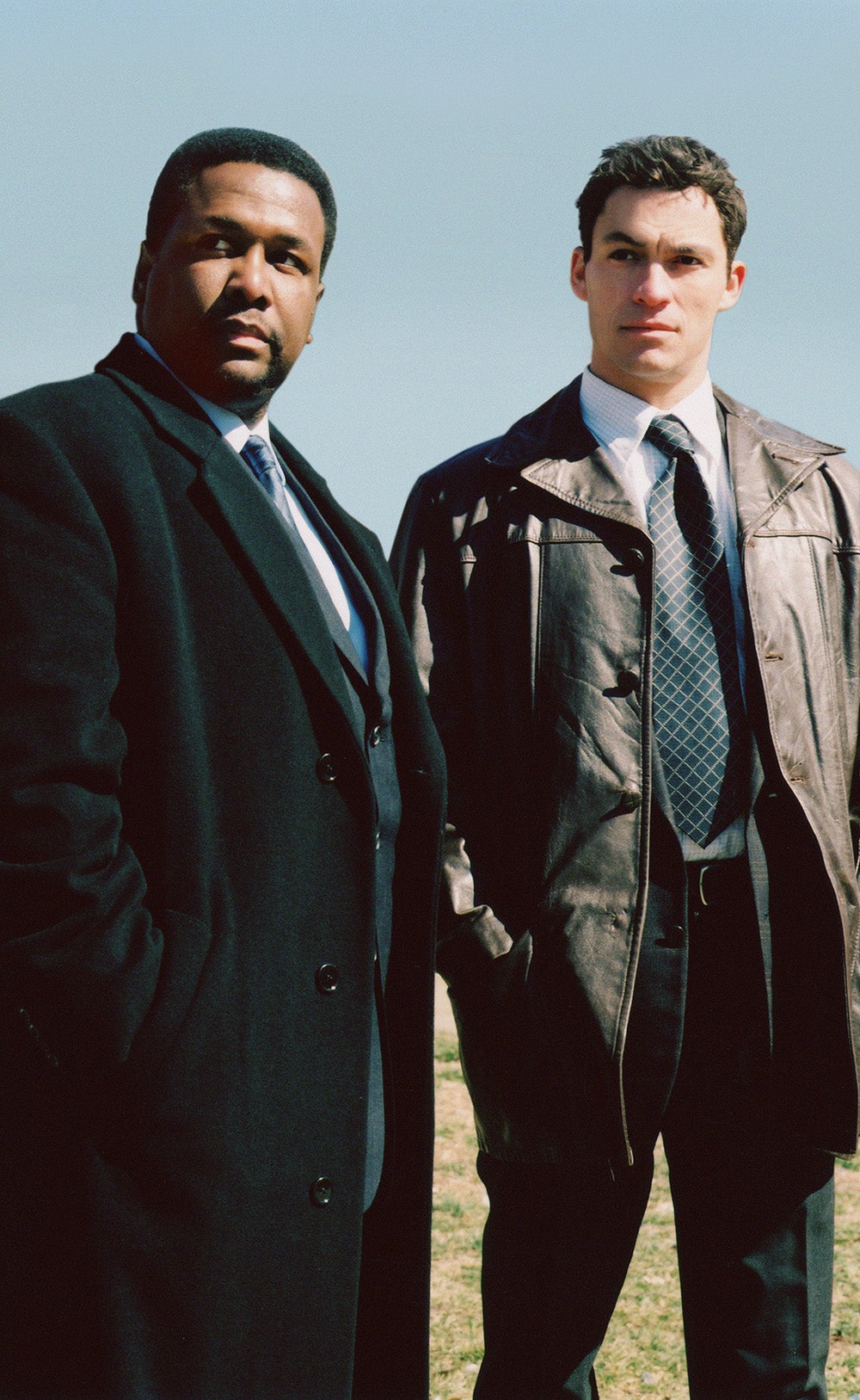Wendell Pierce on politics, The Wire and Jack Ryan: ‘I have a consultant at the CIA who helps me prepare’
The stage and screen actor talks to Andrew Pettie about playing a US spook in John Krasinski’s action vehicle ‘Jack Ryan’, and reuniting with his co-stars on ‘The Wire’ following the deaths of Lance Reddick and Michael K Williams

By his own admission, Wendell Pierce owes his career to a hard-drinking, womanising policeman. His name is William Moreland – Bunk to his friends – and he is one of the best-loved characters in David Simon’s brilliant, labyrinthine crime drama, The Wire.
Playing Bunk in The Wire – which many consider the best TV series ever made – sent Pierce’s career on an upward trajectory to the heights of Hollywood and Broadway. Fans will never forget the show but, 20 years after it debuted, how does Pierce think it’s aged?
“It was the canary in the mine,” he tells me, in his rich, rumbling New Orleans accent. “And I have mixed emotions about that. First, what a wonderful, proud piece of television that I’m part of. That series made my career. It is also still very much relevant and prescient today – which [unfortunately] means we haven’t moved the needle far.”
We’re speaking over Zoom and just like “The Bunk” – who once memorably described himself as a “strictly suit-and-tie motherf***er” – the 59-year-old is dapperly dressed in a matching purple suit and sweater. His latest TV assignment finds him wearing less exuberant colours, however: in the fourth and final season of Prime Video’s Jack Ryan, he is savvy US spook James Greer, aide to the careworn CIA agent of the show’s title (played by John Krasinski). The series marks the latest incarnation of the character. Since the publication of Tom Clancy’s novel The Hunt for Red October in 1984, Ryan has featured in five movies, three video games and 38 books – which have collectively sold enough copies to fill the British Library 10 times over. How does Pierce account for the character’s universal appeal?
“The thing that connects us to Jack Ryan,” he says, “is the fact that, deep down, espionage and intelligence work is the study of human behaviour. Watching the show makes you think: what would I do in that situation? How would I behave in Ryan’s shoes? Could I figure out the puzzle and find the answer? Either that, or you’re on the edge of your seat hoping that Ryan’s choices will get him there.”
There are plenty of Jack Ryan staples in store during the final season, including covert assassinations, strike teams, drug smugglers, terrorist cells and the creeping fear that not everyone in the CIA, or, indeed, the US government, can entirely be trusted. One advantage of telling a new Jack Ryan story over six hour-long episodes, says Pierce, is that it gives more time to explore the characters’ back stories and personal lives. “There’s a realness and humanity to the show,” he says. “I have a consultant at the CIA who helps me prepare and we’ve become friends. Mel is his name – at least that’s the name he tells me. And Mel helped me to understand how the difficulties of being in an intelligence agency can take a toll on your personal life. This is what working for the CIA is really like.”
My father instilled in me the idea that America is something that you have to create. And so the America I love is an idea
Pierce, who was born and raised in New Orleans and later studied at the illustrious Juilliard drama school in New York, is one of the relatively few actors who is equally at home on the big and small screen as he is on the stage. He has acted in more than 30 films – including Selma, Ray and Malcolm X – and approaching 50 TV shows, including playing the father of Meghan Markle’s character in the glossy legal drama Suits. As a condition of today’s interview, though, questions about Markle were politely vetoed.
Despite all those other roles, Pierce remains so closely associated with The Wire that people still shout out Bunk’s name at him in the street. To explain the series’ grip on the popular imagination, he once described the series as “the first visual novel”. Along with The Sopranos and The West Wing, it helped to inspire a trend in complex, multi-layered long-form TV dramas that continues on every major streaming platform to this day.
“I think we’re in a golden age of television,” he says. “Long-form gives you an opportunity to develop the story, to develop characters and their relationships, to go deeper, to go further. Audiences today will stay with a TV show, just like when they’re reading a really good book. They look forward to bingeing, and set time apart to get back to this great story.”

Just like The Wire, the story of Pierce’s own family and career holds up a mirror to the aspirations and prejudices of modern America. A successful theatre producer and businessman, Pierce has described himself as a “true capitalist” and “classic entrepreneur” who believes in the American ideals of opportunity and self-advancement. His family history also contains echoes of the struggles and frustrations that characterised the experience of many Black Americans growing up in the second half of the 20th century. His mother, Althea, was a schoolteacher and his father, Amos, a US army veteran whose racially segregated unit helped to capture the island of Saipan from the Japanese in 1944. Pierce’s father endured many snubs and injustices on his return from the war, but still loved America, even during the times when, in Pierce’s biting phrase, “the country didn’t love him back”.
“My father instilled in me the idea that America is something that you have to create,” he says. “And so the America I love is an idea. It’s a country in constant flux and so there’s a vigilance you have to have with its values. When you make strides forward, don’t think that you won’t have to continually fight to maintain them. Every generation has to fight a battle to make it a more perfect union.”
As an example, Pierce cites the furious ongoing debate surrounding US abortion laws. It’s an issue he evidently understands in detail, as he highlights parallels between last year’s controversial ruling by the US Supreme Court – after which women could potentially be prosecuted by the state in which they live for obtaining an abortion in a different state – with the similarly constructed Fugitive Slave Act of 1850. “In America, there’s a vigilance and an awareness [about US history] that you have to have, no matter where you stand politically. And whatever your position is: you must strengthen your debate. That’s the great thing about America. It is malleable, and that’s what allows us to find a way forward.”

The story of Amos Pierce Jr’s struggle to create the America he wanted to live in found a fitting “moment of catharsis” in October last year, when, at the age of 97, he watched his son star as Willy Loman in Arthur Miller’s Death of a Salesman. It was an inspired bit of casting that made Pierce the first Black actor to play the role on Broadway. (He’d previously played Loman in a run in London’s West End, earning five-star reviews. He later won Olivier and Tony Award nominations for his performances.) Decades earlier and unknown to the young Wendell, Amos had set aside his own creative ambitions to become a professional photographer in order to support his family by working as a maintenance man. Amos also tried to dissuade his son from becoming an actor, thinking that racial prejudice would make it an almost impossible career for him to pursue.
“He didn’t stand in my way, though,” Pierce recalls. “And so on opening night I was able to give him a memento – the pocket watch that [Willy’s older brother] Ben gives him in the play – to thank him for all the love and the time that he gave me. I stepped off the stage and handed him the watch and it was one of the great moments of my life. All my father said was: ‘Hey, man, that’s a good play.’ That’s all I needed to hear.”
As a young actor, Pierce “used to be a theatre snob”, but now loves the remarkable variety of his CV. In fact, he tries to perform in a stage play, TV drama and film every year. Like a pentathlete competing across multiple disciplines, Pierce enjoys the challenge of “flexing different acting muscles and abilities”. On stage, he explains, the energy given off by an actor during a theatrical performance “is like a floodlight. In film, the performance gives off the same amount of light, but condensed into a laser. So whereas in the theatre I might run right across the stage, in the cinema, a quick turn of the head in close-up can have the same impact.”
Thanks to his peripatetic schedule, Pierce divides his time between his home town of New Orleans (“the northernmost Caribbean city”), New York (“it’s just excitement all the time”) and Los Angeles (“I finally figured out LA – it’s 48 suburbs looking for a city”). He is now looking to settle down and find a more permanent home, most likely somewhere in the Caribbean. One of his few great unfulfilled ambitions is to have children. “I will have a family,” he says with measured certainty. “That’s something I’m trying to focus on as I go into my… third act.”

One family of which Pierce will always be a part is the cast of The Wire, who remain close 20 years on. Fans of the show will fondly remember the late-night drinking sessions enjoyed by Bunk and his partner in crime Detective Jimmy McNulty (played by Dominic West). At the time, Pierce, West and the rest of the cast were known for reprising these anarchic scenes for real after filming had ended in the clubs and bars of Baltimore. Does this still happen?
“Oh yes,” Pierce laughs. “[McNulty and I] are in constant reprise! That was the first thing I thought of when I came to London: will I have time to call Dominic to see if he can come into town?” In fact, he adds, a bigger reunion is on the cards: they’re imminently due to attend the wedding of Sonja Sohn’s daughter – Sohn is best known for playing Detective Kima Greggs on the series. “And we’re all going to get together there and blow it up.” It’s particularly meaningful, too, following the recent deaths of two of their other co-stars: Lance Reddick, who portrayed Deputy Cedric Daniels, died from heart disease in March, while Michael K Williams, the actor behind fearless stick-up man Omar Little, died from a drug overdose in 2021.
“We’ve had those sad times, just like any family,” he reflects. “The only things guaranteed in life are the hard times. The joyous moments in life aren’t guaranteed, so you have to embrace them as often as possible.”
‘Jack Ryan’ is streaming on Prime Video
Join our commenting forum
Join thought-provoking conversations, follow other Independent readers and see their replies
Comments


Bookmark popover
Removed from bookmarks